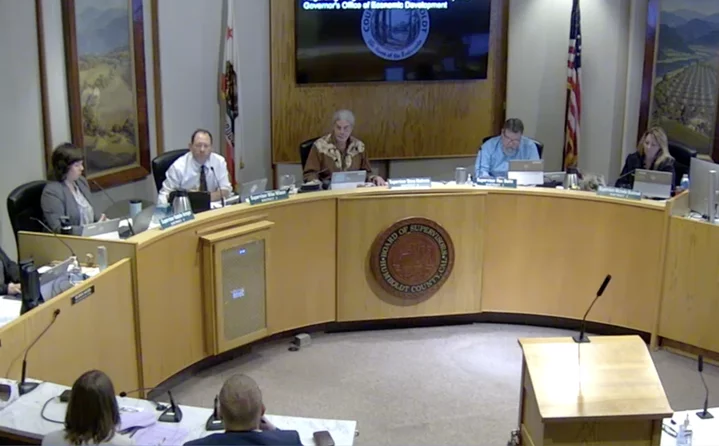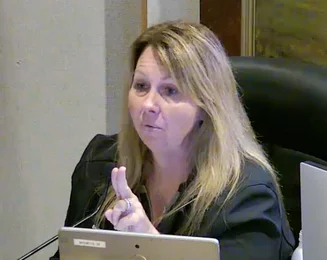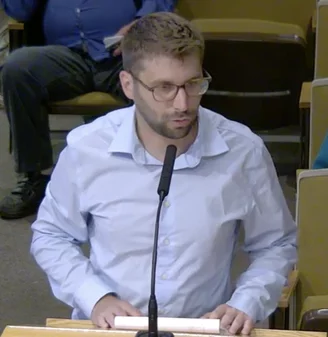Screenshot of Tuesday’s Humboldt County Board of Supervisors meeting.
###
During today’s meeting, the Humboldt County Board of Supervisors took a look at proposed modifications to Project Trellis, the county’s cannabis-focused economic development and local equity program, to address some of the state’s concerns surrounding eligibility criteria.
The Governor’s Office of Business and Economic Development, known as GO-Biz, recently amended some of the rules surrounding the state’s Cannabis Equity Grant (CEG) Program making it more difficult for rural jurisdictions like Humboldt to qualify and apply for state funding.
A few months back, GO-Biz sent a letter to the County Administrative Office regarding the eligibility of Project Trellis. After reviewing the program, GO-Biz staff identified “eligibility criteria that appear to be overly inclusive/inconsistent with the California Cannabis Equity Act and/or may violate the Equal Protection Clauses of the U.S. and California Constitutions” and informed county staff that the program would require modifications before applications could be submitted for CEG in Fall 2023.
The letter notes that the intent of the California Cannabis Equity Act is to “ensure that persons most harmed by cannabis criminalization and poverty be offered assistance to enter the multibillion-dollar cannabis industry.” That includes individuals who have been disproportionately impacted by the War on Drugs and “persons convicted of a cannabis offense” who often “have a more difficult time entering the newly created adult-use cannabis industry due, in part, to a lack of access to capital, business space, technical support, and regulatory compliance assistance.”
GO-Biz requested the following modifications to the local equity program:
- Removal of current Humboldt County residency requirement;
- Removal of language restricting businesses to be located within the county;
- Addition of residency requirement of at least 5 years during the period between 1971 and 2016;
- Increase of business ownership interest from 20 percent to 51 percent.
Staff presented the Board of Supervisors with three recommendations: modify the existing program, execute the $1.2 million grant award from 2022 and apply for funding in the fall, as previously planned; modify the program, execute the 2022 award and refrain from seeking future funding; finalize the previous awards and leave the program as is.
“Presently, we have an award in process from the state, which, if we are to expend that award and make payments out to qualified equity licensees, we will need to comply with the number of changes in requirements to eligibility requirements [that] have been required by [GO-Biz],” Scott Adair, the county’s Economic Development Director, explained. “We have been in contact with state representatives at a staff level to talk about these changes and how they will impact our program and [there is] an understanding that it will have an adverse impact on several equity licensees.”
Second District Supervisor Michelle Bushnell acknowledged that the county will “obviously need to accept the [state’s] recommendations” and asked staff if there was still time to negotiate the proposed modifications without hurting the existing program.
“While I think it’s very important that we do accept, that we allow for Economic Development to write a letter back questioning, you know, that this doesn’t really seem like a one-size-fits-all for a rural county – especially for Humboldt – and see if we can get a response,” Bushnell said.
“We can reply and still adhere to the new requirements, as set forth by the state,” Adair said. “I should note that we have had dialogue with the state on a staff-to-staff level; they’re very aware of our concerns and how the new changes to the program are impacting rural communities in a much different way than they’re impacting urban communities.”
Third District Supervisor Mike Wilson asked staff to explain “what it is that makes this [program] less advantageous for rural communities.”
When the program started, local jurisdictions were able to determine what best suited their qualified candidates, said Humboldt County Economic Development Coordinator Peggy Murphy. Recent changes have made it more difficult for rural communities to continue to administer cannabis equity programs.
“[GO-Biz] is now reviewing all jurisdictions’ programs and it looks like they are trying to create a one-size-fits-all,” Murphy continued. “That’s where we end up falling into a category where it’s more suited to urban jurisdictions than necessarily rural. Our biggest concerns, at this point, are the removal of our residency requirement, which means that we could be funding someone that lives in another state or county. Additionally, it has removed most of the language restricting that the businesses [must] be located in Humboldt County.”
Adair added that the new regulations would exclude cooperatives, which some cannabis farmers view as a way to share the burden and cost of production.
“Co-ops are the only way the small farmer is going to survive,” First District Supervisor Rex Bohn said. “Co-ops allow those people to centrally locate and … they work for the small farmer because it’s a matter of scale.”
Fourth District Supervisor Natalie Arroyo agreed.
“I do think it makes sense to really, really take the opportunity to articulate in that letter how the current state rollout of legalization has been really impactful for small cannabis operations, and to describe how the co-op model is really the future for a lot of the folks here in Humboldt County and many people have embraced that,” Arroyo said. “That may be something that they’re not hearing from [other] people as much.”
Speaking during the public comment, John Casali, owner and operator of Huckleberry Hill Farms, said he was unable to qualify for the state’s equity program. This is despite the fact that he served eight years of a ten-year sentence for illegally growing cannabis in the 1990s. “It should be just a real simple process, I would imagine, to look at my conviction and put a check on a box and then I would save $5,000 [on my license fee].”
Ross Gordon, Policy Director for the Humboldt County Growers Alliance, highlighted the same issue.
“Anything we can do as a county to facilitate those local equity verifications to make sure people qualify for that state program, from our perspective, should be a really high priority,” Gordon said. “Any investment that the county is making right now to keep this program moving forward, continue to improve it, continue to be a stakeholder working with the state to make sure it’s effective as possible. It’s going to pay really long-term dividends for the county and for equity operators.”
Following public comment, Bushnell made a motion to approve the first option – to modify the program, execute the 2022 grant award and apply for funding in fall 2023 – with an additional recommendation to direct staff to send a letter to GO-Biz regarding some of the recommendations.
Arroyo said she would second the motion but asked if the letter would come back to the board for approval before it was sent to GO-Biz. Staff initially said the letter could come back on the board’s consent calendar, but after a bit of additional discussion surrounding the Sept. 30 deadline to execute the agreement to accept the 2022 grant award with new conditions, Arroyo and Bushnell agreed to review and approve the letter themselves.
Before voting on the matter, Wilson emphasized that he, like Bushnell, also grew up in Southern Humboldt in the 1980s and he acknowledged that “there were a lot of impacts associated with that in that community.” But, he said, the “brunt of the impact was in urban landscapes and on BIPOC people.”
“That is really the emphasis of what the state was trying to address with relationship to these impacts of cannabis prohibition,” Wilson continued. “That doesn’t say that we didn’t have big impacts and we don’t have our own communal PTSD around that, but we have to remember where the brunt of that episode really came down.”
After a bit of additional discussion, the board approved staff’s recommendation in a 4-1 vote, with Wilson dissenting.
###
Other notable bits from today’s meeting:
- The Board of Supervisors also considered a request from the county’s Human Resources Department to covert from an Interagency Merit System (IMS) to an Approved Local Merit System (LMS) for Merit System Services positions, which includes the Department of Health & Human Services’ Social Services Branch and the North Coast Regional Department of Child Support Services. Human Resouces Director Zach O’Hanen said the state had recently modified its IMS to require one competitive examination per recruitment, making the recruitment process much more difficult for two extremely understaffed departments. Ryan Bishop, deputy Director of Social Services, said his department has 91 vacancies “an we have tried everything to recruit.” The board approved staff’s request in a unanimous 5-0 vote.
- The board also received a report on the McKinleyville Multimodal Connectivity Project, which aims to enhance walking and bicycle infrastructure between McKinleyville and community destinations to the south around Humboldt Bay. The board accepted the report and asked Public Works staff to take its findings into account when prioritizing future infrastructure projects in and around McKinleyville.
- The board also approved two additional grant applications for watershed restoration projects totaling $39,109. The remaining $247,899 in the Friends of the Eel River Mitigation and Remediation Grant Fund will go to the Department of Public Works to address the list of pre-approved high-priority road improvement projects that will reduce sediment delivery.



CLICK TO MANAGE